To many gamers, the loss of E3 in 2023 is both entirely expected and a horrible shock. For so long, E3 was an institution, an event that was equally looked forward to and satirized. It was an event that gave us both the amazing reveal of the Nintendo DS by Reggie Fils-Aime, and attacking the crab for massive damage. For over two decades, if you played games as a hobby, it was hard not to have an opinion on something that happened during each year’s event.
Now, thanks to the steady rise of constant internet reveals, daily streaming, and COVID, it appears the fever dream of E3 might be over. The big planned return this year was canceled. Geoff Keighley, one of the biggest crusaders for the event, has now turned their attention to the Summer Game Fest in an attempt to revive the excitement that E3 once brought every June. It was a project started because of COVID, but now might become a replacement.
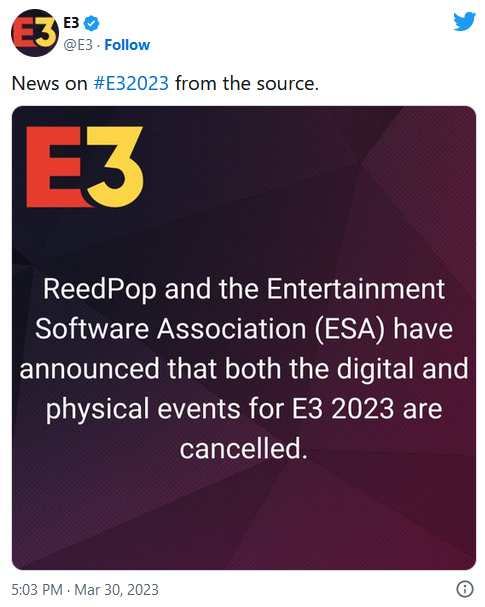
Many hot takes were had that day...
As the news broke late on March 30th, I saw a lot of social media posts about it. Some of it was shock and sadness. Some of it was celebration. Rapidly, I saw a trend emerge: people declaring how E3 was a dinosaur, a relic, something left over from another era, something that no longer made sense. And you know what? Maybe that’s all true. I can’t argue that in many ways, the convention was a silly thing in the year 2023. I’m not even arguing those points.
But it didn’t used to be like that. Gaming wouldn’t be where it was today without this festival, and it’s possible retirement doesn’t change the fact that I’m sad E3 is gone.
First, A List Of Sins
I should make it clear before I wax poetic that I don’t think E3 was without fault. It wasn’t a shining exemplar, and I’m not here to just sugar coat out of nostalgia. In many ways, the expo was taken down simply by changing times. Taking place in Los Angeles since its inception in 1995, the convention felt more elitist over time as the flow of information became more democratic and game reveals became more constant through the internet. As events dedicated to fans instead of press like Penny Arcade Expo rose in popularity, E3 eventually opened up to the public in 2017, but before that it had only been for press and industry individuals.
However, the second major failure of E3 I think was in part due to how it morphed into a game of one-up-manship between major publishers instead of focusing on games. The old console wars of Sega and Nintendo feel quaint as we look to how 2010-era internet forums debated who ‘won’ and who ‘lost’. Journalists eagerly joined in, grabbing as many eyes as possible by seizing on failed joke deliveries. I can’t place a true date on it, but before Sony’s (to put it politely) lackluster reveal of the Playstation 3 in 2006, I always remembered E3 having more of a celebratory air, where the developers and industry people were just happy to all be in the same place.
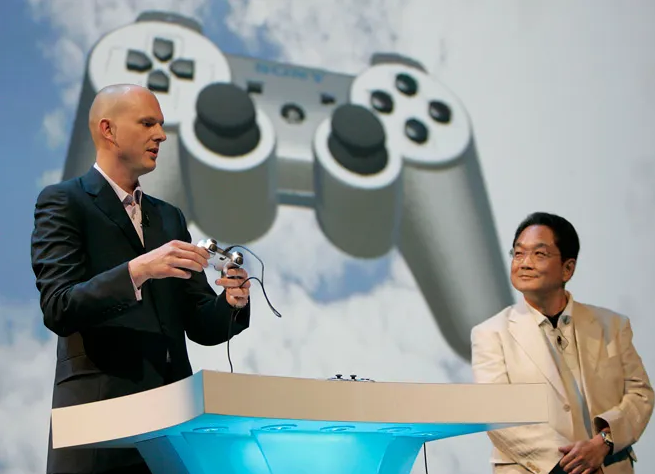
There was a definite 'blood in the water' feeling where everyone wanted to capitalize after such a problematic console reveal. Photo Credit: AP Photo/Chris Weeks.
It could just be me looking back through my teenager-age eyes, but there was a time that the convention didn’t feel so mean spirited.
Finally… while I love games, I’m not a fan of rampant capitalism for the sake of capitalism. As companies fought for attention, they also began to fight for not just some of your money, but (in the wonderful words of James Stephanie Sterling) all of your money. Press conferences weren’t just revealing games, but new loot box models and battle passes. Announced games always had to come with taglines as to how it was the “World of Warcraft killer” instead of standing on their own merit, even as many of these games had their tech demo trailers be revealed as shams, quickly produced to grab pre-orders.
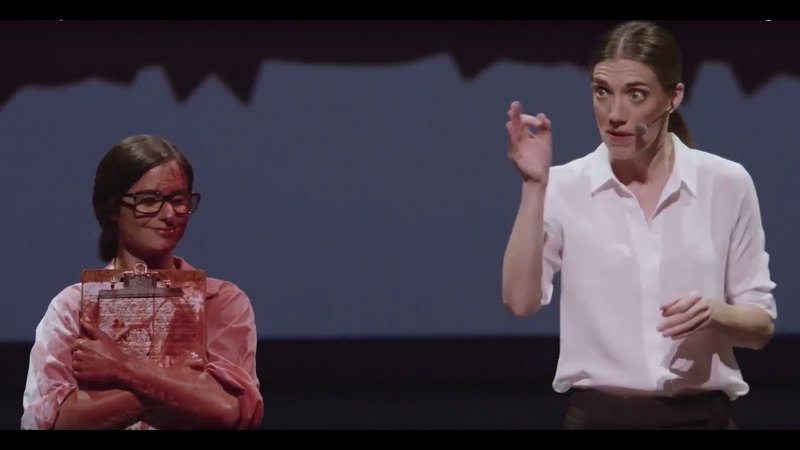
By the time Devolver Digital (very rightfully and hilariously) parodied the standard E3 press conference in 2017 by lashing out at microtransactions and over the top pitches? Many self-inflicted nails were already in the coffin.
A Keystone Of Simpler Times
If E3 is truly gone, it still existed for more than half of the lifespan of modern gaming. It's important to remember that E3 started in 1995, approximately 25 years before COVID shut down live events and lead us to where we are today. For comparison, Pong was made in 1972 and is often considered the unofficial start of video games as a pastime… only 23 years before 1995. Many barbs and jabs on social media decry it as a dinosaur, but you only get called those names if you have already gone the distance.
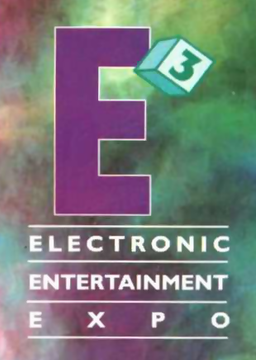
It also might surprise you that E3 was originally financed jointly by Nintendo and Sega to get started. In a moment that defines ‘the enemy of my enemy is my friend’, gaming executives were sick of video games being considered lower class at trade shows such as the Consumer Electronics Showcase. I’ve found quotes about how in order to find Mario and Sonic the Hedgehog at the 1991 CES event, you had to find it in a tent behind the convention center. Games were still considered an afterthought.
This context reveals how practical E3 once had been. It was an event created in order to give video games a sense of importance, credibility, and marketability, and it worked. While numbers vary based on where you look, worldwide sales of video games in 1994 sits around $20 billion. In comparison, 2022 showed a very disappointing $184 billion of revenue.
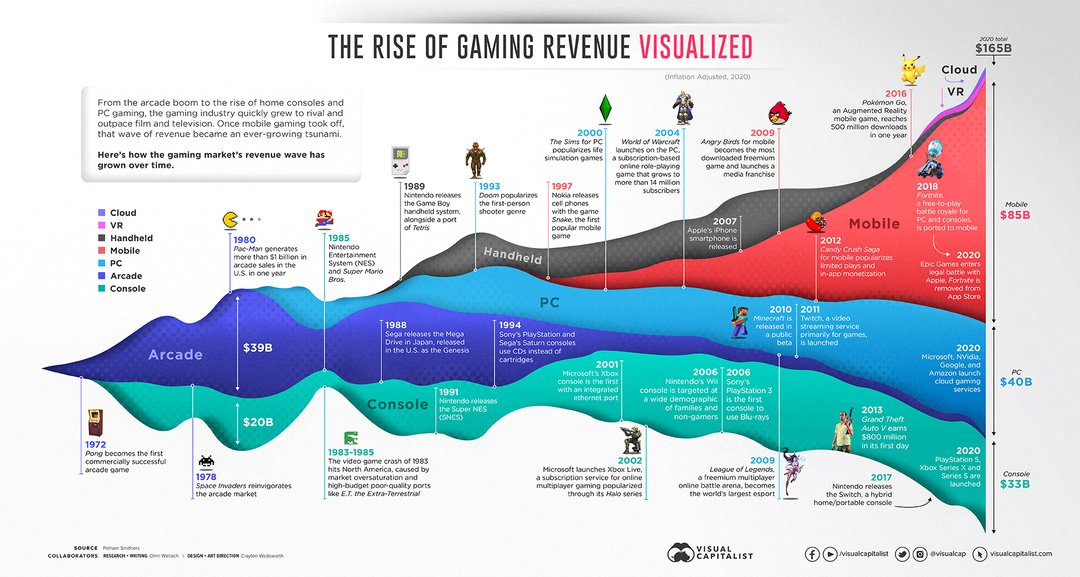
This is one heck of a visual representation from Visual Capitalist ranging from 1972-2020, but the continuous growth since 1995 is undeniable.
Now, correlation doesn’t mean causation, but E3 was a trade marketing event before it was a press conference. It was where large retailers showed up, cut checks, and made deals. The console wars as we know them intensified around the event because this was the chance for these companies to be seen and get their products shown in stores. You know - the way things were done before digital distribution became as natural as breathing air.
To grow as an industry, you first have to be seen and recognized. For a pivotal moment in gaming history, E3 was that place, and its success is one reason why gaming is as big as it is today.
An Emotional Core To Emotionless Capitalism
My last points were ones pointing to practicality, looking at E3 as something of a stepping stone towards today. It was a bridge that helped take gaming from an early hobbyist pastime to a more mainstream sensation. However, there was another function the expo fulfilled, and that was of being a town square.
Unlike cinema or music, gaming didn’t have an immediate way of making a fan feel a connection with its creator. Yes, many people began to feel connections with the characters in a game, having a favorite Street Fighter pick or a particular affinity for Zelda games, but it was to an individual game or series, not to those who created the games themselves. People enjoyed going to local gaming arcades, but attachments to a particular gaming system or an overall gaming culture was rare. You knew who Mario was, but a name such as Shigeru Miyamoto was nothing close to a household name.
I believe E3 helped change that. Even though it was mostly a press event, it let people see the developers who helped make the games. As magazines distributed quotes from game designers and G4TV showed off direct interviews, E3 was one of the few times you could put a human face to the games you played for hours on end. In a small way, it began to humanize the hobby, helping to create a whole story of inspirational creators where there hadn’t been one.
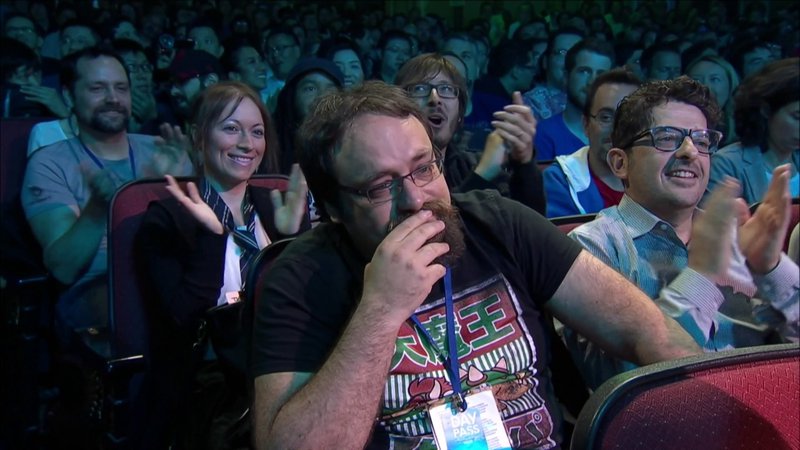
Fast forward to later years as E3 became a whole week of dramatic reveals, and you still see some of the most heartwarming moments from this effect. One of my favorite moments from any presentation was when Davide Soliani, the creative director for Mario + Rabbids: Kingdom Battle was thanked personally by Shigeru Miyamoto. He openly cried tears of joy: Shigeru had been a childhood hero to him for creating some of the most popular video games of all time. Now, he was publicly becoming part of gaming’s lineage next to his inspiration.
There are many great moments from E3 that can be found everywhere that influenced the culture, stuffed around the edges of game reveals and CEOs grandstanding. An amazing case study in this can be found by following the history of Final Fantasy 7. The original game, published in 1997, was the first Final Fantasy that was ever advertised at an E3 event - while FF6 is now widely loved, it at first didn’t get much acclaim outside of Japan for years. The advertising push that helped get Final Fantasy to become a worldwide name started with FF7, and partially at E3.
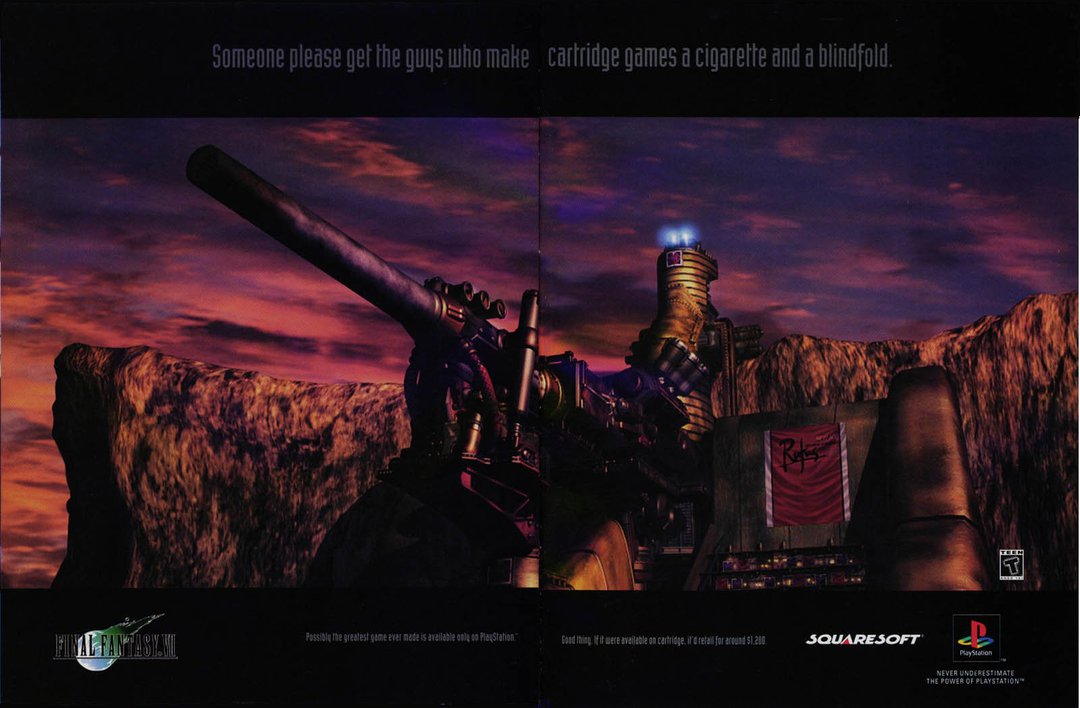
This is a little off topic, but can we just appreciate how off the rails the advertising was in the 1990s for video games? Absolutely bonkers.
Fast forward to 2005, when Sony decided to show off the capabilities of the PS3 by recreating the iconic starting sequence of Final Fantasy 7 with its graphics engine. Websites breathtakingly uploaded tiny articles declaring that there was going to be a remake of this legendary game, only to try and retract those statements as it was announced it was just a tech demo. Hell, Youtube was only several months old that year, and you already found videos of the announcement there from people who smuggled in cameras, the gasps of shock audible in the crowd. I still remember friends talking about this, news spreading through college dorms like wildfire.
Of course, 10 more years later, the strange connection of Final Fantasy 7 and E3 shared would meet again when the actual announcement of the FF7 Remake finally happened. The reaction shouts were loud. It felt like a moment of triumph, of something long teased and promised finally happening.
There’s a human element to the jubilation of these moments, to hearing the live reactions from these announcements. As people gather together for an event, there’s a sense of history being chronicled; do we get the same sense of elation from pre-recorded videos sent out to an invisible audience? Does it tell a compelling story? From the birth of personalities such as Reggie to wonderfully strange moments such as Keanu Reeves’ reveal in Cyberpunk 3077, having an event that was so globally recognized and covered allowed for a cohesive narrative to form.
I’m not saying the value here is only in feel-good nostalgia. Having developers and companies have to publicly present their product allows for scrutiny and reactions. We know that the Playstation 3 had difficulties in the marketplace; over fifteen years later, we can point to their disastrous E3 performance that showed an out of touch presentation. Years later in 2013, the E3 stage became a battleground over some companies trying to crack down on sharing used games. Sony took the chance to upstage their competitors with a simple guarantee, and it possibly was a moment that helped stave off destructive DRM policies from being introduced to consoles.
Yes, E3 has always been a sales pitch. But even as the games industry became increasingly accessible, the week in which E3 took place felt like an invitation for everyone to the conversation. It made companies show their work to a discerning public where everyone was watching. Sometimes it created greatness, and sometimes, it was a chance to check the system.
A Eulogy For Lost Youth And Simpler Times
I hope that by this point it’s clear that E3 was an institution. It wasn’t just a convention, but something that gaming relied on to get it to where it is today. It gave credibility to an industry, it gave clout to those who knew how to master the event and - most importantly to me - it was something communal that I felt included in with my friends.
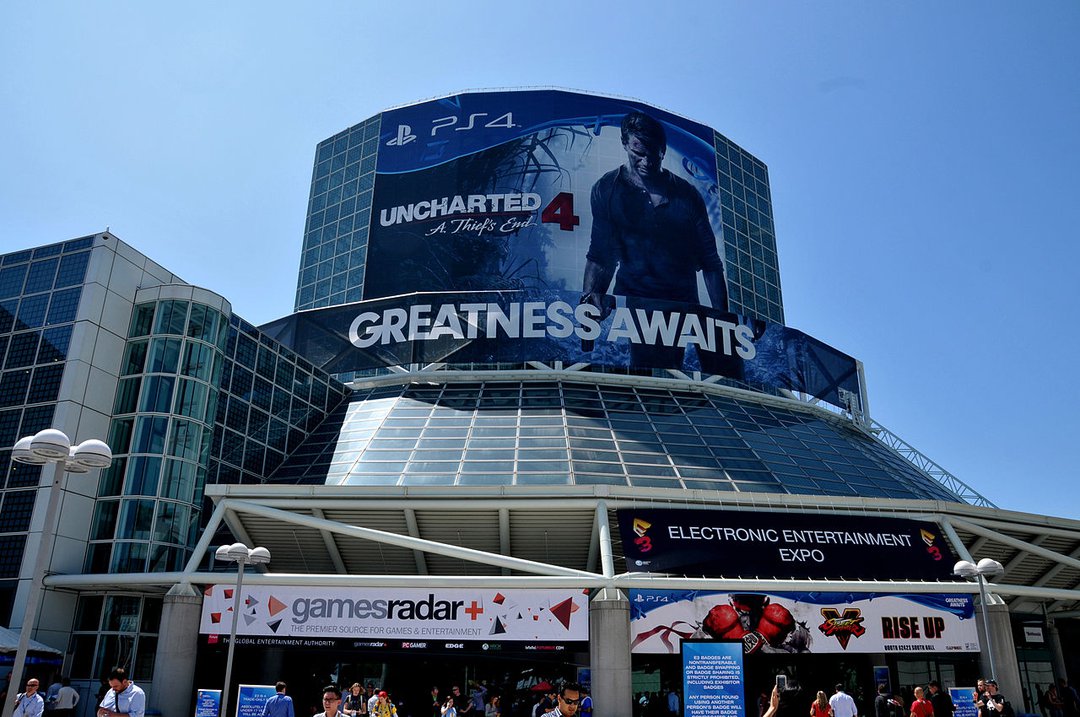
The 2015 E3 Expo Hall. Photo Credit: Glenn Francis at www.pacificpromedia.com
I don’t know if I can properly recreate the emotions I felt about E3 as a kid. Of borrowing copies of Game Informer magazine from a friend’s house to read through all the preview articles. How I’d try to stay up late to monopolize the TV and catch interviews on G4. I’d crave for any sneak peak of the newest Final Fantasy game or heaven forbid, snippets about the next console. Information was precious; like camels bulking up at an oasis, E3 was a chance for kids to hoard hype and excitement that you could live off on for months while you waited for Legend of Zelda: Majora’s Mask to finally release.
I know that some of this sounds redundant to how things are now. We have Nintendo Directs and State Of Play Events and all other sorts of dramatic announcements by publishers on Youtube. It feels as though game leaks happen nearly weekly, online fans competing with the companies themselves to create constant buzz and drama. Critics of E3 would say that the function that the convention once held is obsolete, something from the days before smart phones and constant information at your fingertips.
So why can’t I stop feeling sad about this? From a logical perspective, even the information I got from E3 as a child was inferior: second hand experiences about gameplay, maybe a few screenshots in a magazine to hold me over for months. I’ve never gone to E3 myself, I’ve never had the chance to benefit directly from this convention. So why am I so upset to see this convention throw in the towel this year, perhaps for good?
I think I miss the simplicity of it. I miss the anticipation, I miss talking about the expo for weeks after it happened in the lunch rooms of grade school, excited to talk with friends and not anonymous contrarians on the internet. I miss rushing home to check the mailbox, praying that the latest game magazine with maybe a demo disk hidden inside would be waiting for me every summer. To my friends and I, talking about the expo made us feel important, made our hobby feel as though it had weight and realness when our parents just rolled their eyes and called it mindless garbage.
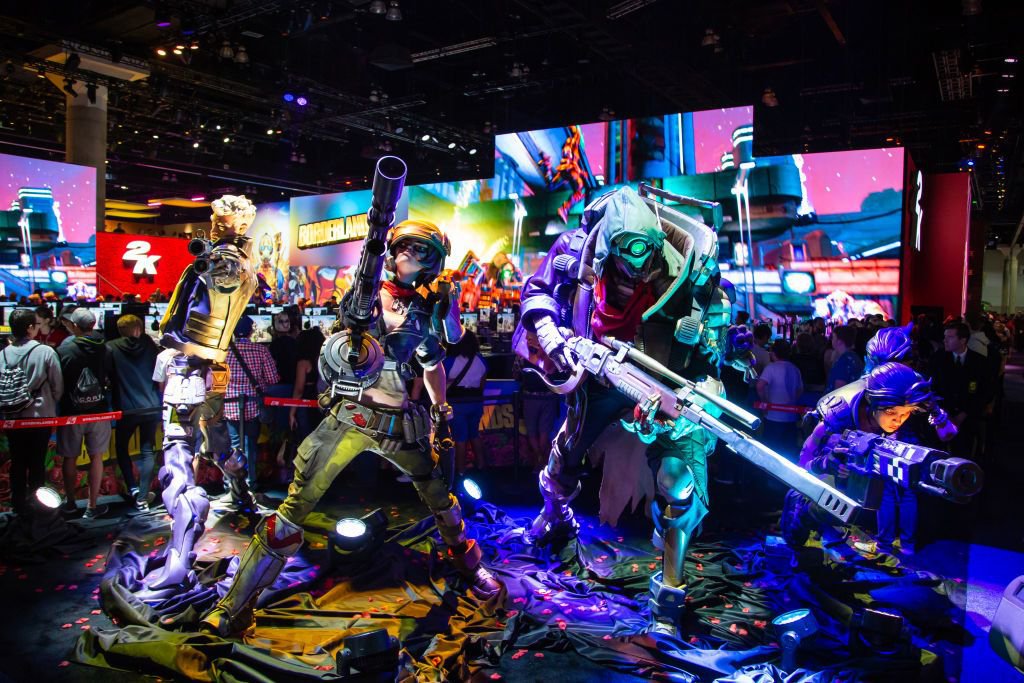
I am fully aware part of my wistfulness is just missing a convention's expo hall. Not being able to attend once since PAX 2020 has me pining for the energy of a live event. Photo Credit: Getty Images, the E3 2019 show floor.
This is where it gets tricky: Am I sad that I never had a chance to go myself, a bucket list item from my teenage years? Am I mourning the loss of E3, or is this just the nostalgia of youth? Would I really want to go back to months without constant gaming news flooding my social media streams? Am I just an old man yelling about a time that no longer exists?
Yes. Yes to all of the above. E3 wasn’t perfect. It was an event that was riddled with the problems that come with conventions and overeager shareholders. As time went on, as the game industry became more predatory and indie games began to flourish outside of the spotlight, the event felt more hollow and obsolete. As major companies began to abandon it, fully glutted on E3s of years past, the convention began to feel like a hollow carcass, the choicest pieces long devoured.
Despite its ignoble death, E3 was an event. It was an event for decades. It was something which gamers could mark our calendars by. Even if you aren’t a fan of Halloween or Christmas or July 4th, you can at least appreciate how a yearly gathering helps mark the changing of the seasons, how their very existence helps stop the months all bleeding together into one very long formless year. As a child, bracing for E3 meant the coming of summer, of freedom, of new possibilities, and as an adult part of me will always miss that feeling.
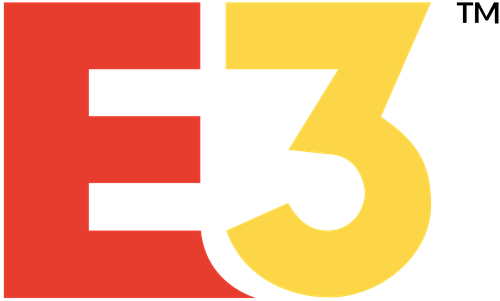
So dear reader, I ask of you a favor. I ask that you raise a glass in the memory of E3: be it water or wine or god help you, an energy drink. Raise a glass and think about what E3 was, of how it shaped a subculture that was just starting to emerge. It was a community event, a trade show, and a chance to feel connected in a time before being eternally online was a possibility. For at least a moment, honor the best of what it stood for before the jokes continue.
Then, hopefully, we can take lessons from E3’s rise and fall as we move onto the next chapter of wherever this crazy subculture is going next.